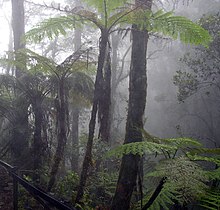Cloud and cloud forest


Cloud forest and cloud forest (often undifferentiated as cloud forest ) are primarily called the two ( extrazonal ) forest formations of the altitude level , which in the mountains of the hot, humid tropics replace the mountain rainforest in a flowing transition .
The cloud forest begins at altitudes between around 1000 meters in the peripheral areas of the climatic zone ( Central America , rear India , Fiji , Madagascar , south-east Brazil ) and from 2000 meters near the equator (central Andean countries in South America, Central Africa , India , Malay Islands ). Above the absolute frost line (between 2000 and 3500 meters depending on the latitude) the cloud forest changes into the cloud forest .
Because of this climatic limit, some authors also refer to evergreen, moist forests in subtropical mountains of the lowest altitude level (for example in the Laurisilva laurel forests of the Canaries between 500 and 1400 meters) as cloud forest . They belong to the vegetation zone of the moist laurel forests .
What all cloud and cloud forests have in common is the fact that the somewhat cooler weather often leads to condensation of the consistently high humidity (see also sloping rain ). The result is low-hanging clouds , fog , drizzle or Taufall who take here a decisive contribution to the supply of the plants with moisture. Tree ferns are typical in these forests on all continents, mostly a very dense undergrowth and numerous epiphytes . In the tropics, evergreen laurel trees form the stand, in the subtropics conifers are added. In the wind-exposed heights of tropical mountains, the cloud forests are dwarfed and gnarled; they are known as elven forests .
The tree line of the tropical cloud and cloud forests is around 3500 to 4000 meters, depending on the continent; in subtropical cloud forests already at around 1500 meters. Here as there, the soil temperature falls below 7 ° C and frost occurs on at least 100 days. Above the tropical / subtropical tree line there are mostly treeless highland steppes ( called Páramo or Puna in the Andes ).
Danger
Cloud forests and cloud forests are among the most endangered terrestrial ecosystems on earth.
Localization of random examples (selection)
Central America
In Costa Rica in the Monteverde Biological Reserve .
In the Mexican state of Veracruz in the Altas Montañas region . There are also cloud forests in the state of Chiapas , e. B. in the nature reserve El Triunfo or in the National Park Lagunas de Montebello .
South America
The montane mountain rainforests, cloud forests and cloud forests on the eastern slopes of the Andes from Venezuela to Peru belong to the second most species-rich megadiversity center on earth.
In Bolivia z. B. in the region of the Yungas . The well-known Inca site Machu Picchu is located in the Peruvian cloud forest on an eastern foothill of the Andes at the transition to the Amazon lowlands .
Asia

In the Philippines at the Banaue rice terraces on Luzón . On the slopes of Kinabalu in Sabah , Borneo . In the central highlands of Sri Lanka, the Horton Plains National Park with its mountain forests is a UNESCO natural heritage site Central Highlands of Sri Lanka . East Timor still has around 100 km² of cloud forests on various mountains in the country, such as Foho Taroman .
Africa
On the western Canary Islands: In the northeast of Tenerife in the Anaga Mountains and on Gomera there are subtropical mountain forests.
Tropical cloud forests and cloud forests lie on the slopes of Kilimanjaro , Mount Kenya , the Virungas , the Ruwenzori Mountains and, on the border with West Africa , the Cameroon Mountains .
Web links
Individual evidence
- ↑ a b c Heinz Nolzen (Hrsg.): Handbook of geography lessons. Vol. 12/2, Geozonen, Aulis Verlag Deubner & Co. KG, Cologne 1995, ISBN 978-3-7614-1619-8 . Pp. 84-89.
- ↑ Spectrum Lexicon of Biology - online: Keyword: cloud forest , accessed on April 10, 2019.
- ↑ Colin Trainor: Three million yr old + Sky Islands and Cloud Forests in Timor-Leste - First biological exploration of Mt Taroman (1,730 m) a small range in the south-west , accessed on October 30, 2015.

